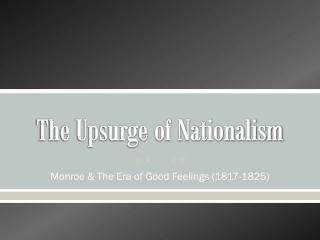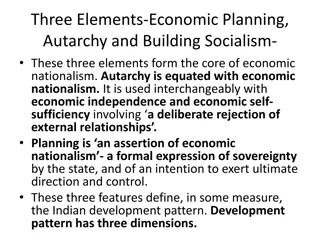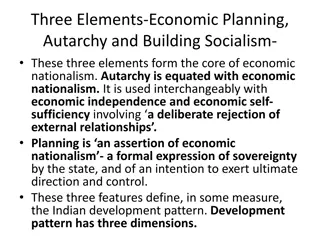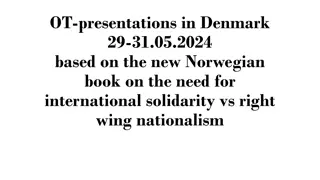Nationalism
The Hapsburg Empire faced challenges due to nationalism and diverse ethnic groups, leading to its decline despite attempts at limited reforms and the creation of the Dual Monarchy of Austria-Hungary in 1867.
Uploaded on Feb 15, 2025 | 3 Views
Download Presentation

Please find below an Image/Link to download the presentation.
The content on the website is provided AS IS for your information and personal use only. It may not be sold, licensed, or shared on other websites without obtaining consent from the author.If you encounter any issues during the download, it is possible that the publisher has removed the file from their server.
You are allowed to download the files provided on this website for personal or commercial use, subject to the condition that they are used lawfully. All files are the property of their respective owners.
The content on the website is provided AS IS for your information and personal use only. It may not be sold, licensed, or shared on other websites without obtaining consent from the author.
E N D
Presentation Transcript
Nationalism Nationalism Threatens Old Empires
The Hapsburg Empire Declines By 1800, the Hapsburg s were the oldest ruling house in Europe Though much of their territory had been lost due to Napoleon and German/Italian unification, they still ruled lands that included diverse ethnic groups
The Hapsburg Empire Declines After the Congress of Vienna, Austrian emperor Francis I attempted to uphold conservative goals against liberal forces The government attempted to limit industrial development because they believed it would threaten traditional ways of life Austria could not hold back the force of change, and they soon began facing the issues of an industrialized nation
A Multinational Empire The Hapsburgs presided over a multinational empire, fewer than a quarter of its citizens were German- speaking Austrians Almost half the empire was different Slavic groups, many who were forced to share the same area with rival ethnic groups The Hapsburgs ignored nationalist demands for as long as they could, crushing revolts that broke out in 1848
Limited Reforms 1848: Amid the Austrian turmoil, 18-year-old Franz Joseph inherited the Hapsburg throne and would rule until 1916 Franz Joseph realized he needed to make changes to the empire, granting a new constitution which set up a legislature The legislature was dominated by Austrians, which did nothing to settle the other national groups in the empire, especially the Hungarians
The Dual Monarchy The Austrian loss in the Austro- Prussian war brought about new pressure for change from Hungarians In 1867, Ferenc Deak, a Hungarian leader, helped work out a deal that created the Dual Monarchy of Austria- Hungary
The Dual Monarchy Under the agreement, Austria and Hungary would be separate states with their own constitution and parliament with Franz Joseph as their ruler Though they would share ministries of finance, defense, and foreign affairs, in all other areas they would be separate of one another
Nationalist Unrest Increases Resentment among people in the Balkans increased at the result of the Austro-Hungarian compromise Nationalist leaders called on Slavs to unite to gain liberty and equality Nationalist unrest was so great in the Austro- Hungarian empire that by 1900 the government was often paralyzed
The Ottoman Empire The Ottoman Turks ruled a multicultural empire stretching from Eastern Europe and the Balkans to North Africa and the Middle East Nationalist demands tore at the fabric of the empire
The Ottoman Empire During the 1830s, both Serbia and southern Greece won independence, however many Serbs and Greeks still lived under Ottoman rule The Ottoman Empire was also home to other national groups: Bulgarians, Romanians, Kurds, Arabs During the 1800s, subject groups began staging revolts against the Ottomans hoping for independence
Dividing the Ottoman Empire In the mid-1800s, European powers came to see the Ottoman Empire as the sick man of Europe European powers began dividing up the Ottoman Empire: Russians pushed toward the Black Sea, Austria took Bosnia and Herzegovina Britain and France set their sights on Ottoman lands in the Middle East and North Africa
War in the Balkans The complex web of competing interests contributed to a series of wars in the Balkans Russia fought several wars with the Ottomans, France and Britain jumped back-and-forth between sides, Germany both supported Austrian authority and the Ottomans The subject peoples revolted against the Ottomans and fought amongst themselves, and many began referring to the region as the Balkan powder keg























